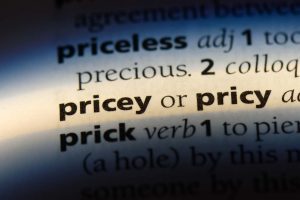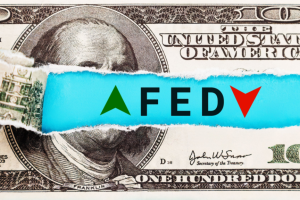
The significance of next week’s Tesla event … what it means for autonomous driving … how it will change the auto ecosystem … an urgent event with Luke Lango
People are calling it a technological shift… it’s going to be more like an economic revolution.
Next week, Tesla is holding an event that has the potential to radically reshape huge swaths of our economy – and your portfolio.
Yes, that’s a grand statement. I don’t write it lightly.
If you read the Digest regularly, you know I try to maintain a measured tone. But what’s about to arrive at our doorstep won’t be “measured.” It’s a technological next step that – if it works as purported and expands across our economy as is likely – will reroute the flow of trillions of dollars this decade.
Disruptions? Oh yeah, they’re coming.
Opportunities? They’re on the way too.
We’ve reached one of those watershed moments that pushes our world in a different direction, changing the playing field forever.
Let’s walk through it together…
One week from tomorrow, Elon Musk and Tesla will hold its “We, Robot” event
It’s expected that the company will reveal its first dedicated robotaxi. This is being heralded as a “game changer” for the future of autonomous transportation.
And if you’re unsure why this is going to be the economic A-bomb that I just painted it as, stick with me…
“We, Robot” is expected to a watershed moment for Tesla wherein the company introduces its first dedicated robotaxi, tentatively called the “Cybercab.” Tesla is also expected to showcase groundbreaking advancements in Full Self-Driving (FSD) software and artificial intelligence as the company pushes toward a future where human drivers are obsolete.
At the heart of this transportation revolution is a convenient, driverless ride at a fraction of the cost of traditional services.
If it’s everything it’s cracked up to be, this is going send ripples throughout the automotive, technology, and investment sectors.
The end of an American love affair?
Americans have a longstanding love affair with their cars. They’ve been featured in songs, movies, and pop culture at large for decades.
But you know what Americans love even more than cars? Being able to put food on their table… which has become increasingly expensive over the last four years.
What happens when we give Americans (and the world) the option of having all the conveniences of owning their own car without the same expense?
Well, we’re about to find out.
Consider what a rollout of Tesla’s robotaxi would mean…
With the tap of a button, you can have a car at your disposal, 24/7, at a much lower all-in cost than owning a car (or purportedly, calling an Uber).
Today, car ownership can be a major financial burden. AAA reports that, last year, the average annual cost to own and operate a car in the U.S. was about $10,000. A fully autonomous, reliable, ever-present robotaxi would enable consumers to save thousands of dollars by eliminating the need for car ownership.
Yes, there will be plenty of Americans who will still want their own. But if you’re one of the 66.2% of Americans living paycheck-to-paycheck today (according to MarketWatch in August), are you not going to seriously consider letting go of your car to free up thousands of dollars per year?
According to a 2022 study by McKinsey & Co., 25% to 30% of urban dwellers would consider using shared autonomous vehicles as their main transportation mode if it were widely available. And if 25% to 30% of Americans decide to stop buying cars, get ready for a financial earthquake.
Consider the economic and investment daisy chain…
First and obviously, we have the major car manufacturers that would be rocked by this size of a reduction in auto demand. We’re talking unprecedented disruption that would require a business-model pivot, and potentially, enormous layoffs.
“Wait, Jeff, you’re not thinking straight. Less car ownership doesn’t mean fewer cars. The manufacturers would just create autonomous cars instead, so the need for the same number of jobs would remain.”
Really? Cars are parked 95% of the time. If you’re merely “renting” your car, when you’re done with it, it speeds away to service someone else. Such a collective ownership of cars will radically explode car efficiency, reducing how many are needed, which would impact how many workers are required.
Now, consider the knock-on effects…
With 25% to 30% fewer drivers (at the beginning – expect this percentage to grow), what happens to the auto insurance industry?
According to Benzinga, U.S. auto insurance premiums amount to more than $308 billion per year. So, what happens with far fewer car owners? Do we lose loads of related insurance jobs? Or does the insurance model switch from vehicle coverage to some sort of ride-based individual coverage? What would be the impact on business models?
Next, what about car mechanics and chain repair shops like Pep Boys and Firestone?
With a massive reduction in the number of vehicles on the road, we could see a dramatic decrease in demand for those businesses.
Keep in mind, electric autonomous vehicles like Tesla’s robotaxi fleet have fewer moving parts than internal combustion engines. So, it’s not just “fewer people driving,” it would be “fewer cars on the road requiring traditional car maintenance.”
Then, what about commodities?
Well, there are major crosswinds.
On one hand, vehicles require large quantities of steel. With 30% fewer people owning cars, that could mean a vast reduction in steel demand.
But would that demand shift to autonomous vehicle charging stations and infrastructure buildout?
We could ask similar questions about aluminum, copper, lithium, and rare earth metals. Does this help or hurt the related mining businesses? What about related mining jobs?
Here’s one you might not have seen coming…
What about real estate?
If 30% fewer Americans own cars, we’re going to need far less public parking. Think about downtown Manhattan, Los Angeles, or Chicago. Consider the potential economic value of a square block that, up until now, is a parking lot.
Does that become a new high-rise residential tower, adding to apartment supply, taking pressure off rental rates?
Does it become new mixed-use retail, resulting in new job openings?
Now, circling back to vehicles, forget consumer cars… What happens when autonomous driving hits our trucking industry?
In the U.S., that’s a $216 billion market with roughly 3.5 million drivers. Think “robotrucks” might be disruptive there?
Now, consider the investment implications…
What will be the impact of all this on the share prices of not just Tesla, but Ford… Alphabet (which owns Waymo, another autonomous driving company)… Uber… Geico Insurance… Advance Auto Parts… U.S. Steel… Freeport-McMoRan… Greystar Real Estate Partners… Knight-Swift Transportation Holdings… the list goes on and on…
And what about the stocks of the companies that make the components for Tesla’s fleet or robotaxis? All the sensors and semiconductor chips? The plastics? The electronic circuitry?
Think about the impacted supply chains for all the sectors we referenced above.
But we’re only just scratching the surface…
What makes Tesla’s “We, Robot” event so revolutionary isn’t its impact on the car industry – enormous though it will be. It’s what it represents for the global economy at large.
Consider what’s at the heart of this robotaxi…
Technology replacing the need for humans.
Does that remind you of anything?
Perhaps the International Longshoremen’s Association strike that began yesterday, with dockworkers demanding assurances that United States Maritime Alliance will never replace human workers with automation?
Perhaps the Screen Actors Guild/Writers Guild of America strikes in 2023, wherein Hollywood workers demanded protections from the rising capabilities of artificial intelligence?
In 2013, Amazon used about 1,000 robots in its warehouses. Last year, that number clocked in at 750,000.

Think about the coming impact of AI and automation on, well, everything…
It’s already affecting jobs for customer service agents… paralegals and legal assistants… accountants… medical diagnosticians… radiologists… financial analysts… journalists… recruiters… insurance underwriters… and marketing specialists… to name a few.
Should we expect it to stop?
Bottom line: We’ve arrived at the economic/investment Rubicon.
Next Monday October 7 at 10 AM EST, our technology expert Luke Lango is holding an urgent presentation to discuss Tesla’s robotaxi event and its economic/investment implications
Here’s Luke describing it:
In that broadcast, I’ll detail all the recent groundbreaking developments in the autonomous vehicle industry, including how robotaxis are set to completely transform transportation, save millions of lives, and potentially put up to $30,000 a year in passive income in your pocket.
We’ll also dive headlong into the highly anticipated Cybercab launch that could unlock a staggering $9 trillion in value – bigger than all of Elon Musk’s companies combined.
We’ll bring you more details on this in the coming days, but to reserve your seat now, just click here. In my opinion, it’ll be one of the most important events our company puts on this year. You need to know what’s coming and its likely impact.
As we wrap up, consider this…
Tesla is one of the most transformational car companies in history, right? Well, what does it tell you that Musk no longer thinks of Tesla as a car company?
Back in April, on Tesla’s earnings call, he made this clear:
We should be thought of as an AI robotics company. If you value Tesla as just an auto company – it’s just the wrong framework…
If somebody doesn’t believe that Tesla is going to solve autonomy, I think they should not be an investor in the company. And we will. And we are.
Tesla’s “We, Robot” event on October 10 marks the beginning of a new era for autonomous transportation
It’s one that will have far-reaching implications across the economy.
By making autonomous vehicles a reality, Tesla is opening the door to tectonic disruption, though similarly ushering in vast new opportunities. Luke believes he’s spotted one of them, so I encourage you to sign up for his October 7 broadcast here.
Bottom line: Tomorrow’s technologies are on the verge of smashing into today, and the shift will be like nothing we’ve seen before.
Have a good evening,
Jeff Remsburg




